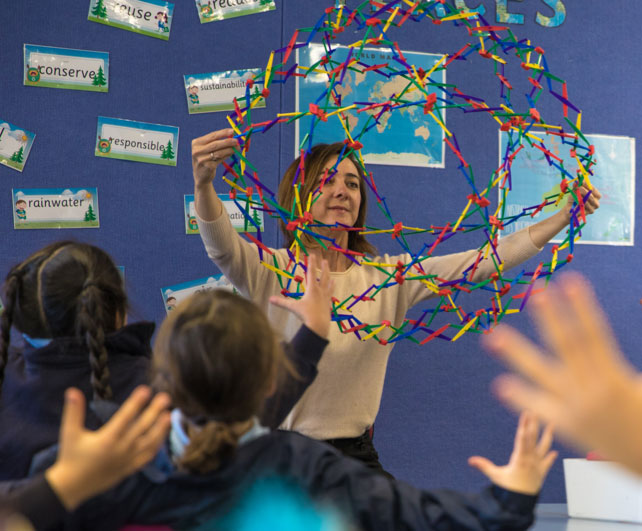Benefits of Mindful Learning Programs

Mrs G is a Year 3 teacher who begins each day with a short ‘Karma Citizen’ discussion on topics like being a peacemaker rather than a bully, compassion, kindness or gratitude. It is followed by 2-3 minutes of gentle yoga stretches and 5 calming breaths to help everyone transition from the busy-ness of their morning into being more present – physically, mentally and emotionally. This daily routine sets herself and her students up for a morning of calm and focussed learning.
After lunch, her students return to a dimmed classroom with soft background music and participate in a 10 minute transitional mindful activity that may involve journaling, colouring or listening to a guided meditation – an “Imagination Vacation” script from one of the Karma Classroom Activity Cards. This experience sets herself and her students up for an afternoon of calm and focussed learning.
Throughout the day, they will enjoy a Peace Pause’or two – a 3-5 minute Dust Buster from the Karma Classroom Cards that can easily be done at the desk. This brain break re-oxygenates their bodies and brains, shakes off any sillies and allows her students to return to their lessons with enthusiasm and focus. It’s a re-set for everyone.
“Five or ten minutes with the Karma Classroom Activity Cards changes the whole environment of the classroom. The breaths and the poses relax me and allow me to be the best teacher I can be, and the kids just love it … they now ask me, “Can we do this breath? Can we do these poses?” Mrs G.
There’s no reasonable reason why every Australian teacher, and every Australian student shouldn’t benefiting from these experiences too. Covid fear and the past 20 months of repeated lockdowns has escalated stress and anxiety and we need to take particular heed of how they have affected our children. Never before has there been a more urgent time to bring daily health and wellbeing tools into our early childhood and primary classrooms.
According to a recent survey produced by Smiling Minds (State of Mind 2021), 41% of parents believe the pandemic has had a negative impact on the mental wellbeing of their children. We also know that 1 in 7 Australian primary students suffer from a mental illness every year (1).
(1. Lawrence D, Johnson S, Hafekost J, Boterhoven De Haan K, Sawyer M, Ainley J, Zubrick SR. (2015). The Mental Health of Children and Adolescents. Report on the second Australian Child and Adolescent Survey of Mental Health and Wellbeing. Canberra: Department of Health.)
Early intervention is key to stemming long term mental health issues. Research shows (and so does Mrs G) that weaving daily Yoga (mindful movement), Breathing and Mindfulness experiences into the curriculum has significant and positive effects for both teachers and children/students, including, but not limited to:
- Teacher wellbeing
- Physical health + wellbeing
- Mental health + resilience
- Social/emotional development
- Academic performance
- School + classroom culture
There are simple and easy to implement programs that are making a significant difference in this space. The Karma Class is one of them. They are committed to supporting teachers’ general health and wellbeing and to giving students tools to build resilience and manage their moods, behaviours and life challenges with more courage and grace.
Their NESA accredited professional development workshop – A Karma Classroom – gives teachers the skills and resources, using the Karma Classroom Cards, to easily weave Yoga, Breath and Mindfulness into every school day, enriching both their own and their students’ health and wellbeing. The program is fun, simple to learn and easy to implement.
The time is now.
If we are to stem the tide of growing mental illness amongst our children, we must incorporate the well-documented benefits of Yoga, Breath and Mindfulness into our classrooms and curricula and commit to supporting them with these simple and effective tools for life.
